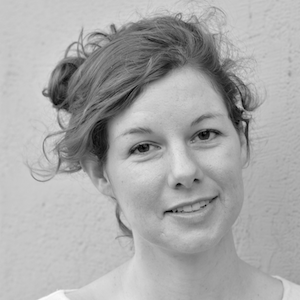We shouldn’t have to prove ourselves, the girls told one another. It’s just not fair.
They looked at one another fiercely.
The sun beat down, hot and indiscriminant. Ahead: the layered rise of canyon walls. The snaking cut of a river. A hiking trail drawn out in a dusty red smear. The girls marched along it three-abreast—the Conciliator, the Ideologue, the Pragmatist—their boots sending lizards into retreat under prickly pear and beavertail cactus.
If the others had been asked, noted the Conciliator, they probably would have left too.
She meant the three boys also volunteering with the Park Service that spring. Together, the six of them had speared cliffsides with shovels, hauled away the rocky guts in wheelbarrows and buckets. A new series of Puebloan ruins had been found. The Park Service needed extra help. And the six students had been recommended by their school as models of fitness and character.
We could have stayed, the Ideologue reminded them.
The shame in her voice made the heat feel hotter. The other girls followed her gaze as it climbed the canyon wall, skirting the puckering clefts of rose-colored cliffs, centuries of sediment stacked high overhead—layers upon layers pressed together, compounded—until at last the sky opened up like an escape hole: fresh, blue, and breathless.
The girls had been told to leave work early that day. Their supervisor had pulled them aside. Mercury might hit a hundred, he’d said. The ruins aren’t going anywhere. No one here will mind if you ladies take off early. There’s AC in the ranger station. Relax, take a shower.
At first, the girls weren’t sure whether to be offended or grateful, but in the moment it had seemed a silly thing to refuse. They had been living in tents. They hadn’t showered in days. So each had let her tools drop. Each had grabbed her pack. Each had started along the trail back to their campsite.
Just be out of the station by four, their supervisor had called after them. That’s when the rangers get back.

Look, said the Pragmatist. The fact is, we left. We might as well enjoy ourselves. And god knows we all could use a shower.
The girls reached a footbridge. One hundred yards of linked cable teasing the river below. They walked in single file, milky water roaring beneath the tread of their boots. The Ideologue had to shout to be heard.
So she shouted.
She howled and cursed and swore. While the other girls looked at their boots, she denounced the indignity of double standards, of relentless stereotypes, of trivialization and degradation and socio-systemic oppression, and as she spoke the river thrashed, sputtered, the bridge trembling with the force of her words.
The girls could laugh again on land.
–Did you see the boys with that pick axe?
–One of them would take a few swings and then they’d all stand around and survey the progress.
–We were working the whole time.
The girls pictured their classmates: scrawny-limbed and sparsely-haired, wide-eyed. A pitiful presence next to the real trail crew. The rangers who bent with sunburnt backs to shift boulders and hack into rock walls. The men who knew the canyon by heart, who could navigate its serpentine curves and sun-warmed crevices, the caves kept dark and secret even in the harshest heat.
The girls began to feel better. As the ranger station came into view, talk of the job evaporated. Collapsing into the shade of some cottonwoods, they pulled off boots and bandanas, shook out their hair. They joked. They laughed. They decided to have fun. They made a point of forgetting what it had been like to leave the work site: the way the rangers, absorbed in the project, hadn’t noticed their departure—but the three boys had. The three boys had paused, leaned on shovels to watch. It wasn’t their bewilderment that had hurt the girls, it was the boys’ expressions when they returned, with renewed intensity, to shoveling—looking as though something had been explained to them and they finally understood.

The sun edged towards the canyon’s western rim. Shadows seeped forth from hidden places. A condor changed its perch. Back at the ruins, a burial mound was spitting red soil and bones. The on-site archeologists were buzzing, comparing notes and measurements. There was talk of a tribal conflict. A spear through an eye socket. Crushed ribs. The rangers took off their hats. Whistled. The boys sucked water bottles and strained their necks to see the latest findings: the pale white arc of a skull, lodged in the earth like a waxing moon.
The rangers slapped the boys on the back.
–Good work today.
–Couldn’t have done this without you.
–Poor sucker.

The girls took too long to shower. Steaming up the bathroom, soaping and singing, they left lakes on the tile floor, then dripped down the hallway. They lingered. They lolled. They showered long enough—the Pragmatist made sure of it—to tiptoe in towels and wet hair by the rangers, just getting back from work.
The girls made themselves noticed.
See? whispered the Conciliator, as the men’s eyes fell across their bodies, followed their sashays through the golden veil of evening light. Who cares about the ruins?
And the Ideologue, she said nothing. She looked up at the warm red rise of canyon walls, thinking of their stony hardness, of the way they wear away.
For more information about this piece, see this issue's legend.

Allegra Hyde is the author of the story collection, Of This New World, which won the 2016 John Simmons Iowa Short Fiction Award. Her writing has been published in The Missouri Review, New England Review, The Pushcart Prize XL: Best of the Small Presses, and elsewhere. For more visit: www.allegrahyde.com.
42.9765° N, 70.6130° W (Star Island, NH)
The summer before I moved to Arizona, I worked as a baker in a hotel on an island off the coast of New Hampshire. The hotel was over a hundred years old and had no air-conditioning. With the multiple ovens running full blast—in the service of cookies, scones, cakes, and other delicacies—the little room reserved for baking became astonishingly hot. It’s okay, I told myself all summer, though I was always red-faced and sweating. You’re preparing dessert to prepare for desert.

